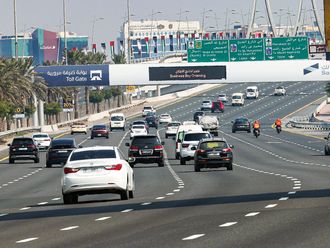
Sharjah: Three leading experts offered a fascinating peek into how cities will grow and function in the future harnessing the power of data at the inaugural Regional Data and Community Development Forum (DCDF 2024) in Sharjah on Thursday.
The engaging panel discussion titled Cities of Tomorrow: Data Integration for Sustainable Development featured Sheikh Fahim Bin Sultan Al Qasimi, Executive Chairman of the Department of Government Relations in Sharjah; former Mayor of Stockholm Anna Jerlmyr and Robert Ndugwa from UN-Habitat, who discussed the role of data integration in shaping urban, global cities of the future.
Summing up what cities of the future must have, Sheikh Fahim noted that ‘security, society and opportunity’, are the key values that the growth of Sharjah is modelled on.
Decision making
“Our economy, valued at $45 billion and supporting 1.8 million people, thrives on our ability to gather and leverage granular data. This approach allows us to be surgical in decision making, ensuring we stay ahead in smart city planning. When we launched Digital Sharjah, we streamlined over 1,500 smart services of which roughly 33 per cent were digitised”, he said, reaffirming the emirate’s commitment to utilising data for urban planning and sustainable growth,” he explained.
Sheikh Fahim also underscored the guiding principle behind Sharjah’s development policies: the household and family.
“In Sharjah, the family is at the heart of everything we do. Every institution we build, every policy we develop, considers how it will impact our communities. With 204 nationalities officially contributing to our city’s population, we are acutely aware of the need to balance cultural needs while fostering inclusivity. This forward-thinking approach places Sharjah at the forefront of sustainable urban development, proving that data is not just a tool, but the very foundation of a brighter, smarter future,” he remarked.
Smart infrastructure transformation
Meanwhile, Anna Jerlmyr, who served as mayor of Stockholm from 2018 to 2022, shared key lessons from her experience of leading one of Europe’s major cities through a smart infrastructure transformation. “The core principles we followed were innovation, inclusivity and resilience. Innovation was driven through close collaboration with the business sector and academia, identifying the precise data we needed to solve challenges. In Stockholm, we forged a climate pact with over 300 businesses, demonstrating how the public and private sectors can work together to meet climate goals,” she said.
Critical role of data
Robert Ndugwa, Chief of Data and Analytics at UN-Habitat, highlighted the critical role of data integration in tackling the housing needs of rapidly expanding populations, improving urban services, and reducing inequality. “We have robust tools like the urban monitoring framework and a set of indicators that have been successfully tested across various cities.”
Addressing the issue of urban overcrowding, Ndugwa said, “If you have more than three people living in a single room, that’s a clear indicator of overcrowding. But that’s just one dimension of the problem. Globally, nearly 2 billion people face unaffordable housing, spending more than they earn and living with reduced disposable income.”
The session, moderated by BEEAH Real Estate CEO Nada Taryam, was held as part of the Forum’s effort to foster dialogue on smart cities and sustainable development and went on to explore the challenges posed by rapid urbanisation, as well as the opportunities for data integration to ensure resource-efficient and liveable cities.












